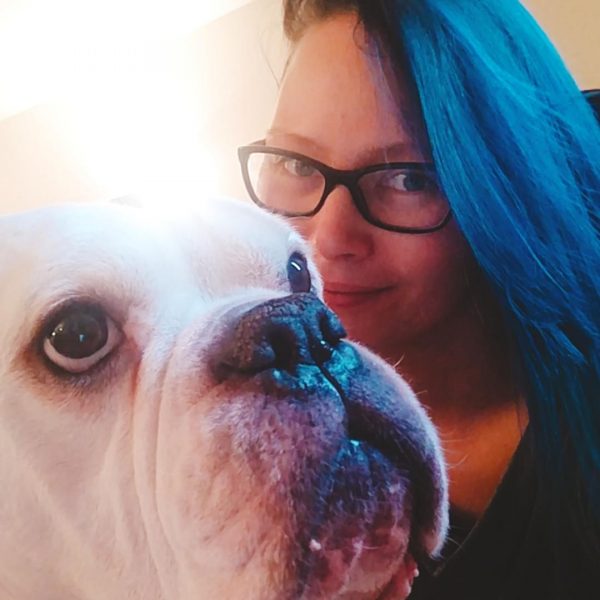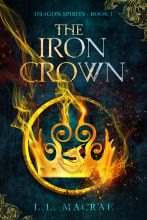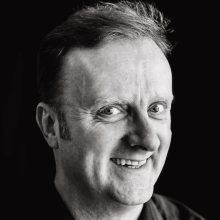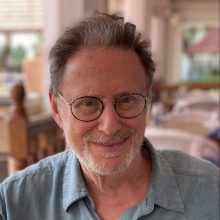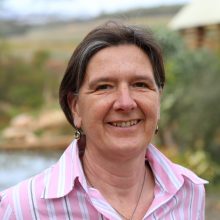What led you into writing?
Escapism. Pure and simple!
I was always one of those kids with their nose in a book. I was also introduced to the sweeping narratives and excellent characters of the Final Fantasy video games in my early childhood (VII and IX in particular). I think when you consume that much media, it’s quite natural to wonder what places would be like in your own world, or what your own characters might be like.
Growing up, I always wanted to write and illustrate my own books – I used to doodle constantly (and still do!), and any sort of creative writing we did at school was something I loved more than anything else. It was a place where my imagination could run wild. I could think up all manner of creatures and magic spells, talking weapons, floating cities and the people who lived there.
As far as I was concerned, somewhere with dragons was much better than the world I lived in!
I used to doodle stories throughout my childhood. Foxes and wolves that could fly, demons that crept through from some other dimension and had to be defeated by heroes, and of course, a plethora of dragons.
I started writing more conventional stories around 10 or 11 years old, and when we got a PC with internet (I was about 14), I discovered roleplaying online.
It blew my mind.
There were forums dedicated to certain fandoms, and others that were purely original, where you could create characters and type out a post of their actions, dialogue, and interactions with the created world and other people’s characters. Aside from a few anxious months where I was terrified I’d misstep, I soon found my feet and would regularly write multiple 2,000 – 3,000-word posts across a collection of characters and stories every day.
I can’t say I was any good back then, but it was a brilliant amount of practice!
However, I started taking writing more seriously when I began participating in NaNoWriMo (National Novel Writing Month) in 2013, and enjoyed one month a year where I could be creative.
One of my NaNo stories became Moroda – my debut novel and the first book in my World of Linaria series – which I published in 2017.
I also spent five years as a professional copywriter (both in house and on the agency side), before going fully freelance in 2019 – although that was swiftly overshadowed by dropping the copywriting to be a full-time author in 2020 after trying to juggle both and realising I preferred writing about dragons than corporate copy!
How does a typical day look?
I’m usually up around 7am and spend the first hour to two hours on emails and admin. This includes planning my day with to-do lists (I live for the satisfaction of ticking off tasks when complete!) based on what I have going on that week or that month.
Admin might include: finding and arranging author swaps and group promos, writing newsletters, plotting out/writing content for Patreon, checking social media/planning posts, prepping for any upcoming book tours or sales, commissioning artwork, or anything else that isn’t physically writing the book – even writing up author interviews (like this one!)
I’ll also dedicate time to “proof listening” audiobook chapters that narrators send through/having conversations with them about changes or progress. (I always seem to have at least one audiobook in production!)
Then depending on whether I’m in the plotting/drafting/editing stages of a particular project will determine what I spend most of the day working on. I usually try and get a couple of chapters written, or amends captured from my editor, or proof a couple of chapters/add questions for my Beta Readers.
I don’t have daily word count targets anymore, but I do try and hit whatever target I set that morning, aiming to hit it by around 5 or 6pm. Sometimes I’m done by midday and then I can rest more/game/read/do more housework(!), sometimes it’s a slog and I end up working until 9pm. Sometimes I get nothing done no matter how hard I try, and the day is just an unproductive one.
I set aside breaks every few hours for housework – cleaning, hoovering/dusting, laundry, shopping, cooking etc. The standard adulting stuff we all have to do! But it is a great time to listen to audiobooks – I listen to more audiobooks while hoovering and cooking than any other time! Of course, if I need to drive anywhere while running errands, that’s prime audiobook listening time, too. Listening helps replenish my creative energy, and often I can jump back into a project after an audio break!
Mondays are also my weekly live stream day over on Twitch. I call it, “Manuscript Monday,” and it’s usually 30 – 60 mins talking on a particular topic. It’s a behind-the-scenes look at being an indie author, where I cover everything from indie publishing to finding cover designers to the craft of writing, and everything in between. It’s at over 50 episodes now! Of course, the conversation sometimes gets derailed and we end up chatting about food for 45 mins, but that’s all part of the fun!
Now things are opening up again and events are running after two years of lockdown, I’m prepping to go back to comic cons. In “the before times”, I went to around 10 events per year, where I sign and sell my book at dealer tables – so there is a big logistics task of prepping for them. Everything from making sure books are pre-signed, swag is ordered, bags are available, as well as booking hotels and hiring a van etc.
I did my first event since lockdown in November 2021, and my next one is in May 2022 – they’re starting to get regular again, so I’m also spending time scheduling these and ensuring everything is booked and ready for them!
And, because I’m secretly an old woman, I’m usually in bed around 9-10pm. I try and read for about an hour before sleeping if I can, but sometimes I just end up on the endless social media scroll!
Of course, if it’s crunch time and deadlines are looming (e.g. just before a new release!), I’ve been known to stay up until 1-2am. Not late for some, but it throws my whole sleep cycle into chaos when I do that, so I try not to.
In what ways do your characters test your abilities?
Trying to make them realistic, with motivations and flaws. Also making them well rounded enough that readers connect with them. It’s quite subjective, and I do have books where many readers love the characters, but I also have books where many of the characters come across as flat, so trying to balance it is definitely testing!
Multiple beta readers usually help point out where characters are falling flat, and their feedback is invaluable!
What’s your setup?
I always need music and tea to write, so that’s a staple of my setup, wherever I am. I also typically use the Pomodoro method for drafting – 25 mins writing and 5 mins of rest. I do adjust this depending on what’s working (or not!) but these bursts usually help the words get onto the page quickly.
I work wherever. Usually on the sofa with my dog curled up beside me (he is the best writing buddy!), a large mug of tea, and movie or video game soundtracks playing.
Sometimes I’ll work at the dining table surrounded with a plethora of notebooks, and I’ll do “live” writing days with other author buddies. We stay on camera (just a Discord video call), keep each other accountable, cheer each other on, brainstorm ideas or discuss plots/characters etc.
Sometimes I’ll just work at the garden table if it’s nice outside, listening to birds and enjoying the sunshine!
We turned our spare room into a home office (sort of) with dual monitors, and I try and work there when editing because the setup is brilliant for that!
What lasting effects have your favourite authors had on your writing and style?
I think it’s continually striving to improve.
It’s easy to look at your favourite books and feel like you’ll never measure up. But it’s always a process. Each book better than the last. Books have made me cry in the past or unreasonably angry with what’s happening to characters, so trying to elicit those emotions is something I try and incorporate into my own writing.
Sometimes I’ll take specific things from books, such as a way of approaching dialogue, foreshadowing, an action sequence etc. in a way that I’d not considered it before. Often, we “don’t know what we don’t know,” so reading a variety of styles helps open the blinds, so to speak, on turns of phrase, using plot devices in different ways – or even what not to do, if something doesn’t gel well.
What do you do for inspiration?
Music helps, and so do video games! Getting outside and allowing my mind to wander, or simply doing/watching something totally unrelated sometimes helps inspiration grow.
Sometimes just going to bed and getting comfy is when my brain throws all the good ideas at me!
I try and put trust in my subconscious that it’ll figure out a plot hole or create a new, fun idea that can be incorporated (if not into my current book, then a future project).
More tangibly, brainstorming with other creatives – especially if they have totally different writing styles! I’ve had brilliant feedback and ideas generated from being part of a writing group, or just discussing a plot with another author. Their objectivity often allows them to comment on things that I hadn’t considered before, and then a snowball of inspiration begins!
What repeating themes do you find yourself pulling into your stories?
My writing is exclusively fantasy, and I seem to typically include:
– Dragons
– The theme of loss of control/losing oneself/trying to be true to yourself when you might not be able to
– Characters trying to do the right thing – even if that’s woefully misguided
– Characters “earning their tiger stripes” – especially if the world is against them
– Someone (usually a woman) wielding a pole arm of some description, and just being badass!
– Vivid and intricate worldbuilding
– Epic action sequences (on the ground and in the air! Water battles to come soon!)
– Easy to read prose without infodumps
– An eclectic cast of characters
– Overall light-hearted and hopeful
How do you wind down?
I enjoy reading and video games (especially story-based ones), so those hobbies definitely take up the majority of my free time. I have been known to end up falling down into a YouTube rabbit hole, though!
I also consider myself a sunflower and enjoy being outside when the weather is wonderful, especially at the seaside (though I don’t go very often).
What sort of challenges do you regularly overcome while designing your world/setting?
Worldbuilding is by far my favourite thing about the fantasy genre – whether reading it or writing it. Sometimes it’s hard to know when to stop, or find a point where all this detail isn’t adding anything to the book itself. I love vivid descriptions where you can immerse yourself in these magical worlds, where you can feel and taste and touch everything around you.
What are you reading at the moment?
I’m currently reading Wolfeater by Anthony Mitchell, which is absolutely outstanding! I’m also reading Rise Red Kingdom by Kerstin Espinosa Rosero, which is the sequel to Burn Red Skies (also a fellow SPFBO7 Finalist).
Both of these reads are brilliant and I highly recommend checking out these authors!
What’s the most useful advice you could give to an aspiring author?
Keep writing. Follow the new, shiny ideas until you can write one to the end. Writing a novel is a slog, so keeping motivated as often as possible will help get chunks of it written! Also thinking what you have written is terrible rubbish that should be burned is entirely normal and part of the process. It will pass.
Tell us about the book you’re promoting.
The Iron Crown is the first book in my Dragon Spirits trilogy – epic fantasy with a huge focus on adventure, dragons, magic, and curses!
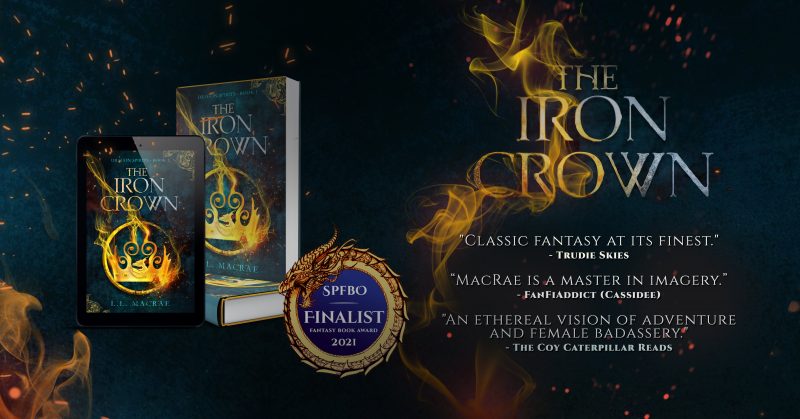
👋 Hi! I run Author Interviews
As a new writer I found myself itching to contribute to a thriving, creative community, so I made Author Interviews and I've met loads of wonderful people in the process. You can buy my debut fantasy RINGLANDER: THE PATH AND THE WAY from Amazon.
